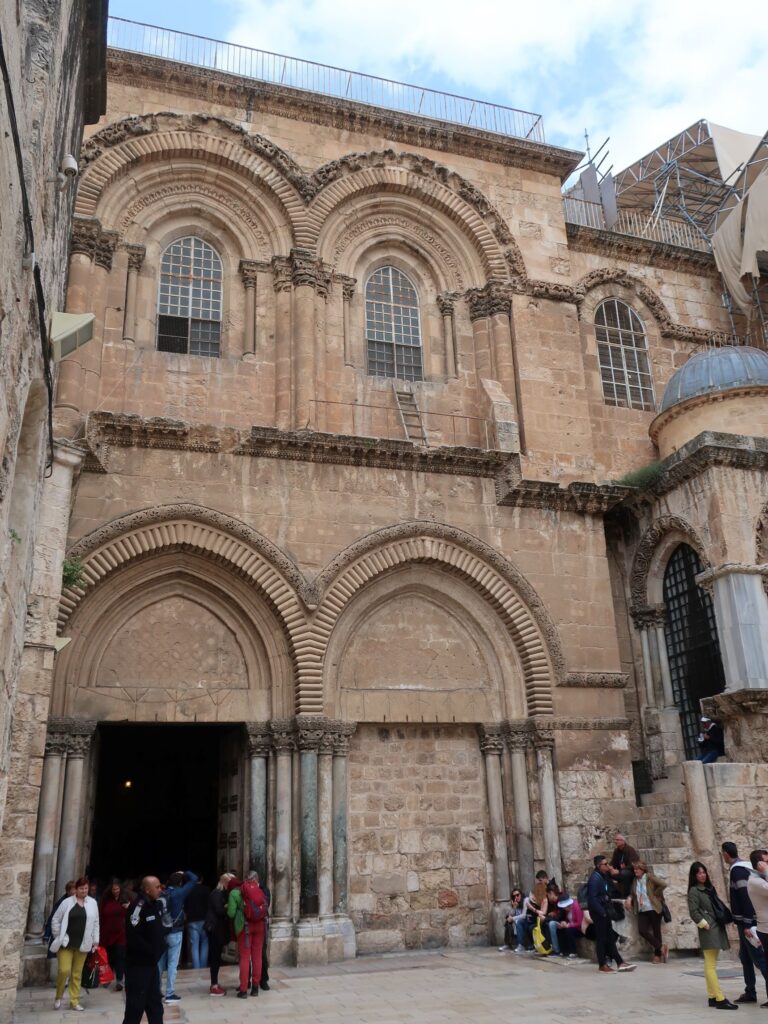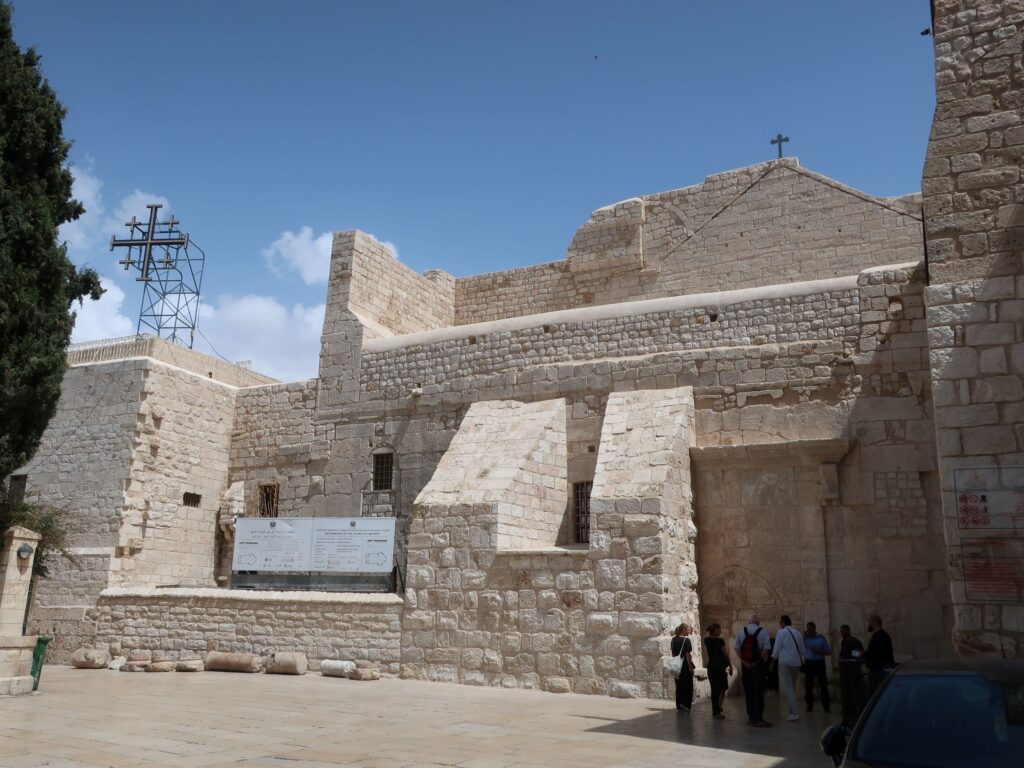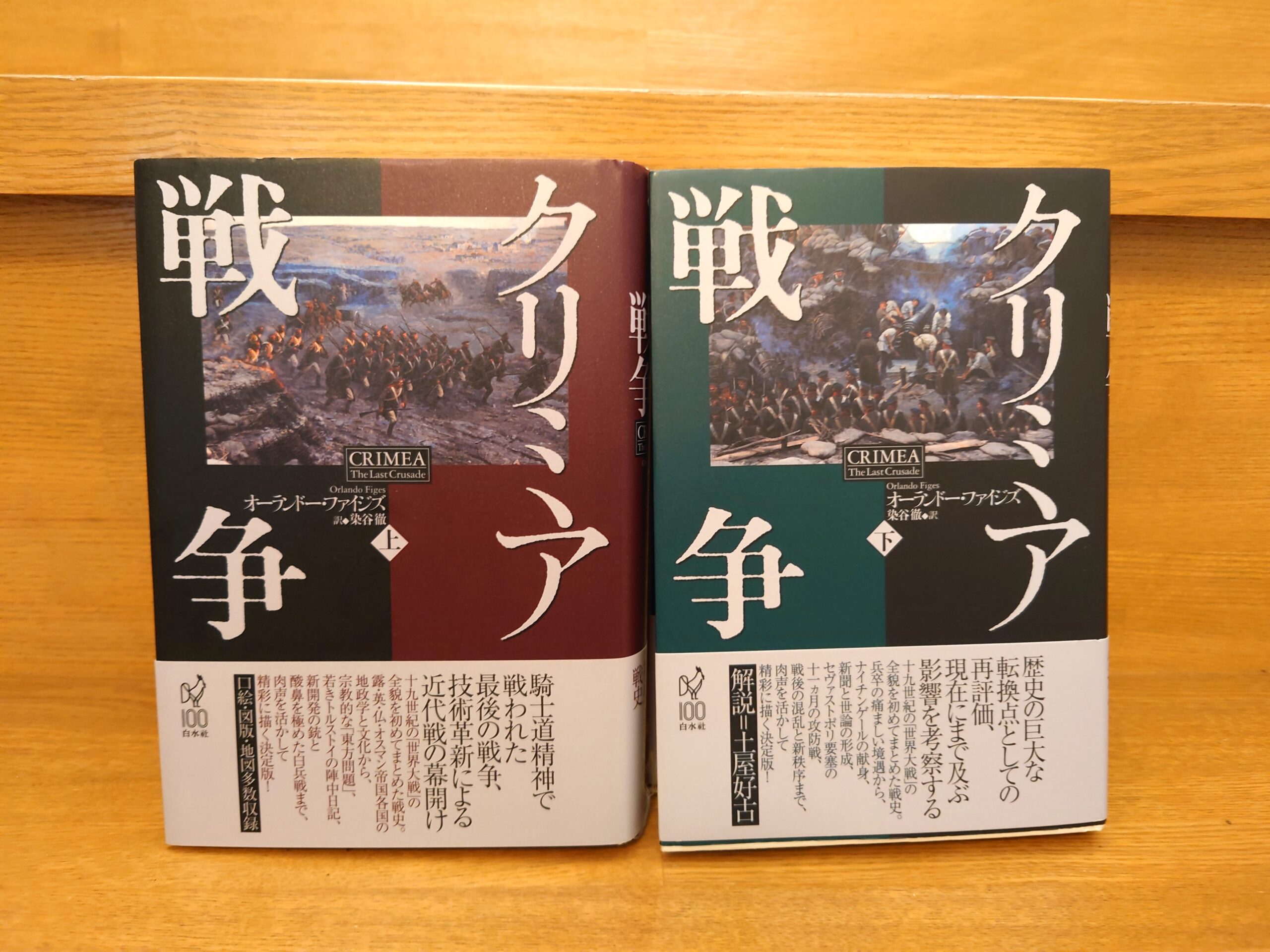O. Fayziz, "The Crimean War" Summary and Comments - A great book to learn about Russian-Ukrainian relations and modern Western European affairs!
We are pleased to present "The Crimean War," written by Orlando Fages and translated by Toru Someya, published by Hakusuisha in 2015.
Orlando Fages has been featured on this blog before.Natasha's DanceHe is the author of
This work was highly recommended as one of the best books to learn about Russian culture and spirituality, and the "Crimean War" presented here is also one of the best books to learn about what the Russian spirit is and why Russia is so obsessed with Ukraine and Crimea.
Let's take a quick look at the book.
The first full-length military history of the "World Wars" of the 19th century.
This is the definitive edition of the book, which presents a colorful depiction of European affairs, the political, economic, and ethnic problems of each country, the exploits of the nightingale, and the battles that culminated in the acidification of the war.The last war fought with chivalry, the dawn of modern warfare through technological innovation
This is the first military history to compile a complete picture of the "World Wars" of the 19th century. From the geopolitics and culture of Russia, Britain, France, and the Ottoman Empire, to the religious "Eastern Question," to the diary of the young Tolstoy, to the newly developed guns and the extremely acidic hand-to-hand combat, this is the definitive edition that makes full use of the real voice of the warriors and painstakingly depicts the war in its entirety!
Includes many illustrations, drawings, and maps.(For a long time now) there has been almost no serious discussion of the religious background that led to this war, the complex international politics involved in the "Eastern Question," the competing relations between Christianity and Islam in the Black Sea region, and the anti-Russianism that prevailed in Europe. Without these issues, however, it is difficult to understand the nature of the Crimean War and its importance.(From the "Preface")
Hakusuisha (publishing company)Products Page.
I was really surprised by this work as well.
I was stunned to learn that the Crimean War was such a war.
Although this war is covered in world history textbooks, it is a reminder of how intricate the background was and how the effects of this war have continued to the present day.
The book will first take a close look at the religious war aspect of the Crimean War.
The textbook explanation is that the war started with the protection of the Slavs in Jerusalem, but the process leading up to it was surprisingly complex and deep-rooted.
First of all, we are informed in the book that, in the first place, the war was preceded by an intensifying struggle between Roman Catholics and Russian Orthodox over control of the Church of the Holy Sepulchre in Jerusalem and the Church of the Nativity in Bethlehem.
Then, just before the war, violent incidents broke out in which religious leaders on both sides beat each other over control of the absolute holy places in Christianity, resulting in a catastrophe in which churches were razed and people were killed.


These churches are the holiest of holy places in Christianity, and it is unusual that in such places, even though they are of different denominations, fistfights between Christian religious people occur to the point of causing deaths. I visited these churches in 2019, but I didn't know they had such a history until I read this book...
The reason why the Roman Catholic and Russian Orthodox churches in Jerusalem and Bethlehem came to conflict with each other to such an extent is also complicated. In addition to the long history of the two churches up to that time, the social situation peculiar to the middle of the 19th century had something to do with it. The author states the following about this.
The background to the intensification of the rivalry between the two Christian denominations, Catholicism and Eastern Orthodoxy, was the rapid increase in the number of pilgrims visiting Palestine in the nineteenth century. The advent of railroads and steamships made mass group travel possible, and the Holy Land of Palestine became an easy destination not only for Catholic travel groups from France and Italy, but also for the pious middle classes of Europe and America at large. Churches of all Christian denominations were quick to expand their influence. Churches of all denominations opened mission stations in Palestine for the convenience of pilgrims of their own denomination, and they were the first to purchase land, establish dioceses and monasteries, and invest money in the area. Schools were also opened to convert the Orthodox Arabs (mainly Syriacs and Lebanese), the largest population of Christians in Palestine, but the least educated, to Catholicism.
'During the past two years large quantities of ornaments have been sent to Jerusalem as gifts to adorn the Church of the Holy Sepulchre. The senders are the governments of Russia, France, Naples, and Sardinia," William Young, British Consul for Palestine and Syria, reported to Viscount Palmerston, Foreign Minister. It was 1839.
From the numerous indications, it is clear that jealousy and hostility are growing among the various sectarian churches. In the past, small-scale disputes between Catholic, Greek Orthodox, Armenian Orthodox, and other monasteries in the region have been constant, but they did not become serious problems while disputes were resolved according to the amount of bribes given to Turkish government officials. However, those days are becoming a thing of the past. The inter-church strife is not unconnected with a conspiracy that is engulfing all of Europe over religious issues.
Hakusuisha, Orlando Faiziz, translated by Toru Someya, The Crimean War, p. 31-32.
Religion is not only religion.
The episode above is a case in point.
The world literally became smaller in the 19th century with the Industrial Revolution and the advent of railroads and steamships. The very concept of geography and time has changed, and this has had an impact on various fields. It seems to be shown that religion is no exception.
The tensions in the Christian world in Jerusalem were closely related to these social conditions.
There are also more complex and deep-rooted conflicts involved. We will look at those things in great detail in this book. You will be amazed at what you will find as you read. It is a terrific book.
In the "Preface" to the book, the author describes the Crimean War as follows. This section is a bit long, but we will take a closer look at it because it is a clear summary of the book's features.
Each country entered the Crimean War with its own unique motivations. Nationalism and rivalry among imperialist states were intertwined, and each country's religious interests were tied to it.
For Turkey, it was a war to halt the collapse of the Ottoman Empire, which had begun in its European part of the region, to defend the Ottoman Empire, to defend its sovereignty against Russian demands to intervene as protector of the Eastern Orthodox Christians residing within the Ottoman Empire, and to It was a war to fend off the threat of an Islamic nationalist revolution that was threatening the
The British, on the other hand, claimed that the war was to protect Turkey from Russia, which was bullying the weak. The actual motive, however, was to deal a blow to the Russian Empire, which threatened the interests of the British Empire as a competitor in Asia, and through this war to force the Ottoman Empire to liberalize its trade and expand British religious rights.
For Emperor Napoleon III of France, the war was an opportunity to restore France's international authority and influence. It was also an opportunity to rewrite the map of Europe as the federation of free nation-states that Napoleon I had envisioned, though not necessarily to regain the same level of glory as during the reign of his uncle, Napoleon I. Within France, there was also pressure from conservative Catholic forces that took advantage of the fragile Second Empire and pressed for a religious war with Russia.
For both Britain and France, the Crimean War was a crusade to defend European freedom and civilization against the barbaric and tyrannical Russian threat. Russia's aggressive territorial expansionism was considered a serious threat not merely to the Western world but to the Christian world as a whole.
On the other hand, what was driving Tsar Nicholas I, the greatest party to the Crimean War, was his inflated ego, the result of his twenty-seven years on the throne; his own belief in the methodology of the powerful Russian state in dealing with its weaker neighbors; his gross miscalculation of the reaction of other powers to his policies; and, above all, his belief that Russia's mission was to protect the Christians in the Ottoman Empire even if it meant sending a crusader army to do so. Above all, it was Russia's firm belief that its mission was to protect the Christians in the Ottoman Empire, even if it meant sending a crusader army, and that it would not hesitate to wage a religious war to accomplish this mission.
Tsar Nicholas I of Russia was determined to fight against the whole world in order to carry out his holy mission of extending his Eastern Orthodox empire not only to Constantinople but also to Jerusalem.
Hakusuisha, Orlando Faiziz, translated by Toru Someya, The Crimean War, p. 26-27.
Some line breaks have been made.
I couldn't help but associate this passage with the current situation in Ukraine. How do you feel?
And the author continues.
Historiography has tended to downplay the religious motivation that was a factor in the Crimean War. The Holy Land dispute between the French-backed Catholic or Roman Church and the Russian-backed Greek Orthodox Church, namely, who would take control of the Church of the Holy Sepulchre in Jerusalem and the Church of the Nativity in Bethlehem, was the starting point of the Crimean War and a sufficient reason for the Russian emperor to open the war. But few history books have devoted even a few pages to this religious issue.
The idea that a trivial issue such as who controls the keys to the door of a church could have brought the powers into a great war was considered absurd until the modern era, when we are now facing a religious war.
Some historians cited the Holy Land conflict as an illustration that the Crimean War was an "unnecessary and foolish war.
Another historian's theory is that the real cause of the Crimean War was the rivalry among European powers seeking to expand their influence over the territory of the Ottoman Empire, and that the religious conflict was merely the trigger for the outbreak of the war. According to those historians, the real cause of the Crimean War was the rivalry among the imperialist powers, the competition for markets, and the growing nationalist pressures within their respective countries.
While all of this is partly true, it must be said that they underestimated the importance of religion in the nineteenth century (if there is anything to be learned from the Balkan wars of the 1990s and the Islamic extremist movements still raging today, it is that religion has a decisive role to play in adding fuel to the fire of war (If there is anything to be learned from the Balkan Wars of the Ku Klux Klan and the Islamic extremist movements still raging today, it is that religion has a decisive role in feeding the flames of war.) All the powers used religion as a means of intervening in Eastern affairs. In this imperialist conflict, politics and religion were inextricably intertwined. All nations entered the war believing that God was on their side.
Hakusuisha, Orlando Faiziz, translated by Toru Someya, The Crimean War, p. 27-28.
This book will help you understand the meaning of what is being said here.
I am sure you will be surprised at how much significance religion had in this war. I was surprised too.
And the book is also very suggestive in terms of Russian spirituality. Of course, Russia is a vast country where various ethnic groups coexist. Therefore, it is not possible to say with certainty that "this is the spirit of Russia. There are many aspects that vary from person to person. It is the same in Japan. Even Japanese people are very different from each other, and the cultures of Tokyo and Osaka are quite different.
However, I think it is significant to know what the Czar of Russia thought about Crimea at that time and how he thought about the territorial issue, as well as to consider the military issues in Russia today.
I don't think I am the only one who feels that there is an overlap between this book and the current situation in Ukraine.
The book also tells the story of Tolstoy, who served in the Crimean War, and we hear the voice of Dostoevsky, who expressed his views on this war. The book also tells of the work of the Nightingale and Paxton, the engineer who designed the Crystal Palace for the World's Fair in London.
And, above all, it is a depiction of war itself.
War tends to be told in heroic tales, but few decent battles are told in this war due to incompetence of commanders, confusion in the chain of command, and a series of unexpected events. Most of them are a series of haphazard battles and suicide attacks with no regard for casualties. There are almost no beautiful strategic battles as in movies and novels.
The dead, the wounded, the sick...
The reality is so different from the glorious wars told of in distant Europe and Russia...
Soldiers are forced to fight and lose their lives without knowing what they are fighting for.
Soldiers suffer from disease and starvation even before they can fight.
And local residents caught up in the war.
The reality is that each was a victim of war, and that their sacrifices created more hatred and atrocious crimes that spread beyond the Crimea and into the Balkans....
The reality was too harsh for this war.
Although the Crimean War is a little talked about event in world history, it is easy to see how this war had a significant impact on later history. In a world shaken by the situation in Ukraine, it is very significant to learn about this war.
I highly recommend this work.
The above is a great book to learn about the Russian-Ukrainian relations and modern Western European affairs in O. Fayziz's "Crimean War"! The above is "O. Fayziz's "The Crimean War".
Next Article.
Click here to read the previous article.
Related Articles







































